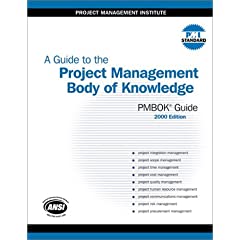A Guide to the Project Management Body of Knowledge (PMBOK Guide): 2000 Edition
By Project Management Institute
Publisher: Project Management Institute
Number Of Pages: 216
Publication Date: 2001-02
ISBN-10 / ASIN: 1880410222
ISBN-13 / EAN: 9781880410226
Binding: Hardcover
Book Description:
A Guide to the Project Management Body of Knowledge (PMBOK® Guide)- 2000 Edition is your basic reference and the world's de facto standard for the project management profession. It was designated an American National Standard (ANSI/PMI 99-001-2000) by the American National Standards Institute in March 2001.
The Project Management Body of Knowledge (PMBOK®) is an inclusive term that describes the sum of knowledge within the profession of project management. The PMBOK® Guide identifies and describes the subset of principles and practices within the PMBOK® that are generally accepted and applicable to most projects most of the time. The guide also provides a common lexicon for talking about project management. Project management is a relatively young profession, and while there is substantial commonality around what is done, there is relatively little commonality in the terms used. An extensive glossary further aids in standardizing definitions of the most important concepts, terms, and phrases.
The Project Management Institute (PMI®) uses the PMBOK® Guide as one of the references for the Project Management Professional (PMP®) Certification Examination. Major revisions and expansions of this edition include:
• Aligned newly added processes, tools, and techniques with the five project processes and nine knowledge areas. For example, reserve time, variance analysis, and activity attributes were added to Chapter 6 (Project Time Management); estimating publications and earned value were added to Chapter 7 (Project Cost Management); and project reports, project presentations, and project closure were added to Chapter 10 (Project Communications Management).
• Added a section in Chapter 2 to acknowledge the role of the Project Office; expanded the treatment of earned value management in Chapter 4 and Chapter 10; and added a brief discussion of the Theory of Constraints in Chapter 6.
• Expanded Chapter 11 (Project Risk Management) to include six processes instead of the previous four: Risk Management Planning, Risk Identification, Risk Assessment, Risk Quantification, Risk Response Planning, and Risk Monitoring and Control.
• Strengthened the linkage between organizational strategy and project management throughout.
The PMBOK® Guide is one of those indispensable tools that you will want at your fingertips, both at work and in your home office. Selected as a suggested resource for CAPM®, CAQ® Automotive Product Development, CAQ Capital Projects, CAQ Information Technology Systems, CAQ Information Technology Networking, and CAQ Project Management Office exam preparation.
Look for official translations in 8 languages:
• Chinese
• Spanish
• Portuguese
• French
• German
• Italian
• Japanese
• Korean
By Project Management Institute
Publisher: Project Management Institute
Number Of Pages: 216
Publication Date: 2001-02
ISBN-10 / ASIN: 1880410222
ISBN-13 / EAN: 9781880410226
Binding: Hardcover
Book Description:
A Guide to the Project Management Body of Knowledge (PMBOK® Guide)- 2000 Edition is your basic reference and the world's de facto standard for the project management profession. It was designated an American National Standard (ANSI/PMI 99-001-2000) by the American National Standards Institute in March 2001.
The Project Management Body of Knowledge (PMBOK®) is an inclusive term that describes the sum of knowledge within the profession of project management. The PMBOK® Guide identifies and describes the subset of principles and practices within the PMBOK® that are generally accepted and applicable to most projects most of the time. The guide also provides a common lexicon for talking about project management. Project management is a relatively young profession, and while there is substantial commonality around what is done, there is relatively little commonality in the terms used. An extensive glossary further aids in standardizing definitions of the most important concepts, terms, and phrases.
The Project Management Institute (PMI®) uses the PMBOK® Guide as one of the references for the Project Management Professional (PMP®) Certification Examination. Major revisions and expansions of this edition include:
• Aligned newly added processes, tools, and techniques with the five project processes and nine knowledge areas. For example, reserve time, variance analysis, and activity attributes were added to Chapter 6 (Project Time Management); estimating publications and earned value were added to Chapter 7 (Project Cost Management); and project reports, project presentations, and project closure were added to Chapter 10 (Project Communications Management).
• Added a section in Chapter 2 to acknowledge the role of the Project Office; expanded the treatment of earned value management in Chapter 4 and Chapter 10; and added a brief discussion of the Theory of Constraints in Chapter 6.
• Expanded Chapter 11 (Project Risk Management) to include six processes instead of the previous four: Risk Management Planning, Risk Identification, Risk Assessment, Risk Quantification, Risk Response Planning, and Risk Monitoring and Control.
• Strengthened the linkage between organizational strategy and project management throughout.
The PMBOK® Guide is one of those indispensable tools that you will want at your fingertips, both at work and in your home office. Selected as a suggested resource for CAPM®, CAQ® Automotive Product Development, CAQ Capital Projects, CAQ Information Technology Systems, CAQ Information Technology Networking, and CAQ Project Management Office exam preparation.
Look for official translations in 8 languages:
• Chinese
• Spanish
• Portuguese
• French
• German
• Italian
• Japanese
• Korean










